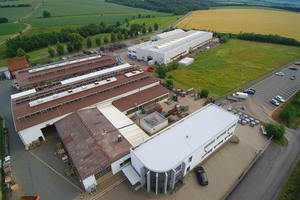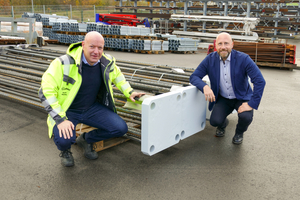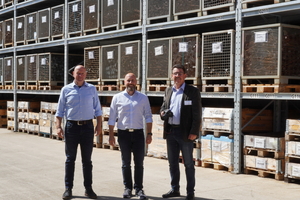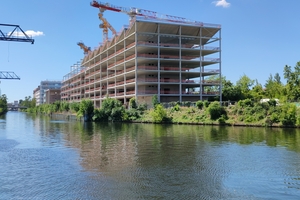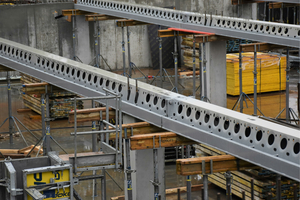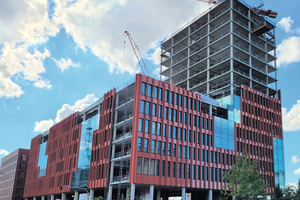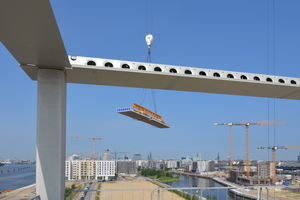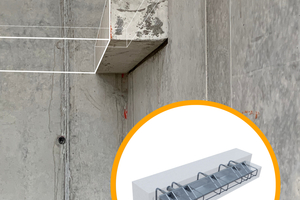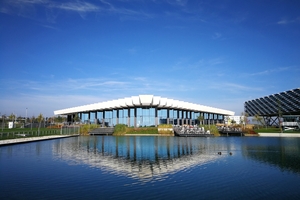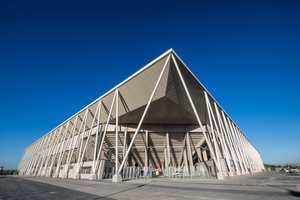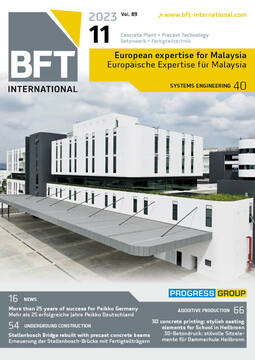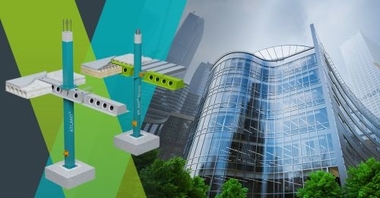More than 25 years of success for Peikko Germany
Peikko Deutschland GmbH was established in 1997 – Peikko’s first sales organization outside Finland. This sounded the starting gun for the company’s globalization. Nowadays, Peikko standard products and special built-in parts are manufactured in Waldeck and supplied to customers worldwide.
Peikko Deutschland GmbH was established in 1997 – Peikko’s first sales organization outside Finland. This sounded the starting gun for the company’s globalization. At the beginning of the 2000s, what had been a pure sales organization became a production entity. The Waldeck site was expanded to include a production facility in order to meet the requirements of the German market.
Automation of production and the manufacture of standardized items began in Waldeck in 2005: the first welding robots were installed for column shoe production. In 2006, Peikko Deutschland was designated as a hub for standard items. The sister companies, which had meanwhile sprung up throughout Europe, were supplied from here. Increasing sales and an expanded range of products resulted in increased space requirements. In 2008, an additional production facility was built, which included staff rooms and offices, and 2.5 million euros were invested in up-to-date machine technology.
Standard and non-standard products for customers worldwide
Nowadays, standard products and special built-in parts from Peikko are manufactured in Waldeck and supplied to customers worldwide. The engineering department supports design offices and precast producers in designing and using the Peikko products. The sales department is also growing to ensure good customer service. New orders promote further growth. In 2016, Peikko invested in the production of Modix rebar couplers at the Waldeck location. Two CNC-controlled lathes with bar feeder and automatic high-bay warehouse for the raw materials are in use. In 2021, additional space was once again required at the Waldeck site due to a high order intake. Anchor plates and non-standard components are stored and packed in the new building. “Peikko Germany has repeatedly been able to obtain major contracts for various industrial and sports facility structures as well as in the field of energy production. Today, Peikko Germany is one of the largest cutting-edge production sites of the global Peikko Group,” managing director Christian Gerke says with some pride.
“The ‘Peikko spirit’ and exciting projects make Peikko an attractive employer and training organization for a wide variety of different trades and occupations in the region. Our work is characterized by our openness to future-driven, pioneering construction technologies, such as hybrid structures and circularity in construction. We are confident that theongoing development of Peikko Germany will continue into the future,” adds Tobias Althaus, also managing director at Peikko Germany.
Keeping an eye on the ecological footprint
Significantly reduced carbon emissions with slim-floor structures and flush composite beams: the ecological footprint of buildings over their entire lifecycle should be taken into account as early as in the design stage. Especially spacious, sophisticated architectural designs are therefore preferably realized using heavy-duty, slender slim-floor structures. Since its introduction in 1989, Peikko’s flush Deltabeam composite beam has catered to open spaces, slender slab structures and flexible floor plan designs at every stage of the building cycle.
The latest model of the composite beam, Deltabeam Green, can do even more for the ecological footprint. Compared to conventional Deltabeam beams, the green composite beam reduces carbon emissions by approx. 50 % (EDP available). More than 90 % of recycled materials are used in its production. It is manufactured with renewable energy and is transported using bio diesel and environmentally compensated fuels.
Complementary solutions for hybrid structures
The use of timber in construction has enjoyed a remarkable renaissance in recent years. New technologies have made it possible to significantly expand the possibilities in timber and hybrid timber construction. It is therefore not surprising that timber is now also used in high-rise building construction. The first buildings using this approach are already under construction in Germany.
To create efficient hybrid structures, Peikko has recently added standardized timber connections to its portfolio that allow a seamless and reliable combination of timber and concrete in large and heavy structures. Under the name of Puuco (Finnish: tree), these components include beam shoes for glue-laminated timber beams, corbels for connecting Deltabeam composite beams with high, multi-story columns, timber-concrete composite slab connectors for transmitting forces between a CLT slab and topping concrete, wall shoes for connecting CLT walls with foundations or concrete slabs, as well as column shoes for glue-laminated timber columns as a modular connection for maintaining cross sections.
“Supporting” role and design element
The acquisition and integration of Besista International GmbH has been a recent addition to the portfolio of Peikko Group Corporation: the Besista tension and compression rod systems are used for bracing in buildings and other supporting structures. The systemusually remains visible in the building and, in addition to its actual function, is a stylish design element. The slender rod elements and distinctive rod anchors create flowing transitions between timber, steel and concrete structures as well as glass façades. The rod systems play a supporting role, for example, in prestigious structures such as sports stadiums, shopping malls, office buildings, theaters and bridges.
The system comprises tension and compression rods, rod anchors, pins and locking rings, cover and extension sleeves, circular discs, angle and cross anchors, as well as couplings. The tension rods can be manufactured to a length of up to 15 meters and feature an exceptionally long adjustment length. The rod anchors are manufactured from ductile cast iron. They provide load-bearing capacity, flexibility and safety for both the anchorage system and the anchored structure. The hot-dip galvanized tension rods and rod threads with special hot-dip galvanized zinc finish offer corrosion protection over the entire service life.
The system is ETA-approved and carries the CE marking. The correct threading depth can be checked visually. Axial deviations of up to 2 ° can be compensated. There are 24 thread sizes available with limit tensile forces of up to 2016 kN. Different compression rod connections allow the use of steel or wooden compression rods.
Peikko at BAU 2023 in Munich
In April 2023, Peikko was an exhibitor at BAU trade fair in Munich, presenting solutions for connection technology, slim-floor and composite structures in reinforced-concrete, precast and composite construction. The focus was on concepts to improve the ecological footprint, circular economy and hybrid structures in timber and timber-concrete composite construction.
In addition to the new tension and compression rod systems for bracing buildings and supporting structures, Peikko presented solutions for the efficient support of prefabricated staircases and walls, a cable loop system for connecting precast elements, such as wall-to-wall or wall-to-column connections, and new, slender composite columns for multi-story buildings in conjunction with Deltabeam frames.
Outstanding reference projects
One of the most prestigious reference examples is, undoubtedly, the avant-garde office building “THE SHED” on Berlin’s Sonneninsel (Sun Island). The offices are to be housed in three different buildings, with the “Warehouse” being the largest of these with a floor space of around 34,530 m². The “Workshop” with 2,070 m² and the “Loft” with 2,960 m² are located in the immediate vicinity and nestle right up to the Neukölln shipping canal. Thanks to a total of 5,700 m of Deltabeam composite beams from Peikko, construction company BATEG GmbH was able to build at high speed; in addition, Peikko supplied bolted column connections. The foundation slab was realized with a concrete floor slab in combination with Deltabeam, the other floors with prestressed-concrete hollow-core slabs. This Berlin construction project is seeking LEED certification in the much-coveted Platinum category, which underscores the focus on sustainable construction and energy efficiency.
“EDGE ElbSide” in Hamburg, another office building, is a no-less impressive project realized in Germany with Peikko participation. Its slim-floor structure comprises Peikko precast concrete columns and the Peikko Deltabeam composite beam, as well as Brespa prestressed floor slabs supplied by Schneverdingen-based DW Systembau. It should be noted that the intended timber structure design for the “EDGE ElbSide” building had to be abandoned in favor of the prestressed precast elements mentioned above as it was impossible to meet the high requirements for the supporting structure and for fire safety in a commercially viable manner using a timber design (for a detailed project report, see BFT 10/2023, p. 42 ff.).
Other major reference projects include “adidas HalfTime” in Herzogenaurach, the Federal Chancellery in Berlin, Marienturm, Omniturm, OpernTurm and “The Squaire” (all located in Frankfurt), as well as the new football stadium of Bundesliga team SC Freiburg.
Strategy and commitment
The construction and use of buildings is responsible for more than 30 percent of carbon emissions worldwide. Nonetheless, fairly little money is generally invested worldwide in research and development in this field. Most efforts to date have been aimed at reducing the emissions that a building generates during its lifecycle as a result of its operation – heating, cooling, and lighting. Research on how the carbon footprint can be influenced through smart building design and the type and production of construction materials is a fairly recent phenomenon.
Peikko recognized many years ago that there is potential for change in this area, and has ramped up investments for sustainability in the R&D area. Currently, over 28 % of all ongoing development projects are dedicated to this field. The results are incorporated into product development and production processes. “It is of vital importance that we continuously work to produce and transport our solutions while making efficient use of resources. But there is more: many of our products can not only be installed quickly, but can theoretically be removed again at the end of a building‘s lifecycle for subsequent reuse. However, legislators still have to clarify legal questions regarding product liability,” says managing director Christian Gerke.
Peikko has done extensive testing on installation/removal/reinstallation and has published the results in white paper reports. The latest publication on this topic is a design concept. It introduces Peikko’s removable connections and their significance for the construction industry. It explains the main requirements and options available for the production of beam and column connections, providing valuable insights into the real-life application of these connections. “We see great opportunities to continue to develop our business in the field of recyclable products in the coming five to ten years,” Gerke adds.
In addition to developing recyclable products, Peikko has also been working on its own sustainable development goals at economic, social and ecological levels (ESG), which are directly aligned with the UN’s 2030 Agenda.
The company has stipulated, for example, that by 2025 the share of renewable energy used by its global production facilities must amount to 75 %. Peikko is well on track: in 2022, the share of renewables already stood at 72 %. The production site in Waldeck also contributes to achieving these goals with a photovoltaic system on the production building.

